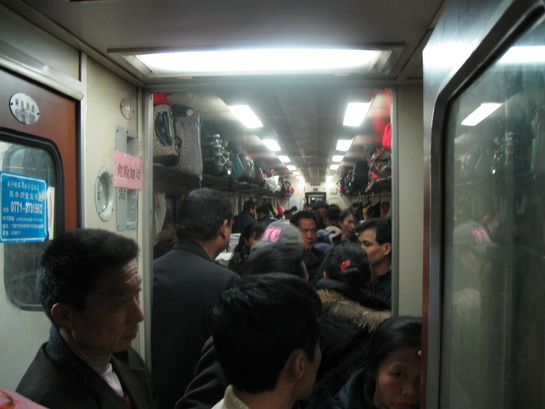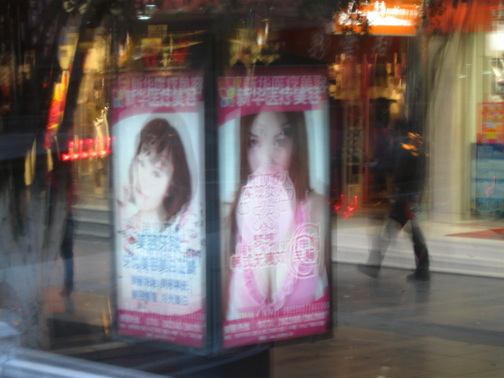To understand why transportation is so difficult for me at the moment, you have to understand one of the craziest traditions that the Chinese have every created. Every spring festival (also known as Chinese new year), at the beginning of February, everyone has to go home. No matter whether you live next door or five provinces away, no matter whether you are rich are poor, no matter how long you have been away, the call home for spring festival is one of the most emotionally charged imperatives in the Chinese soul. Combine this with a country populated by 1.4 billion people, 200 million of whom live and work on a migratory basis, and the result is a holiday traffic boom of proportions seen nowhere else on earth.
I got into Guilin in the morning and went straight to the train station, where I waited in line with a mass of students and migrant workers. When my moment finally came, I quickly found out that the next sleeper bunk available back to Nanjing was not for ten days, and the next seat was not for a week. There was no way that I could get back to Nanjing in time for classes without resorting to a means of travel I had never used before: the standing ticket.
At spring festival, however, standing tickets become the means to cram as many human beings as possible into a train car. And so it was that I got on the K1192 to Nanjing, a 26 hour ride, with a ticket but no seat.

The picture to the left, to be clear, is not of people boarding the train. Those with seats have already sat down, leaving those visibly in the picture where they are. A rough count (imprecise because movement was more or less impossible), put this car at at about 220 people to 140 seats, not to mention baggage. The conductor spent ten minutes cramming more people on before the train could leave. He briefly decided that no more would fit, then realized that he could not really turn away somebody who had been sold a ticket, and the cramming continued. After the train was underway, he fled into his office on the left.
By evening, a sort of natural entropy had settled people into corners and many had enough space to lean against or squat on their baggage for comfort. The conductor came out and, seeing the single foreigner, invited me into his office. I felt intensely awkward being given a place to sit in front of the dozens of seatless people around me, but the other option was to refuse - giving my fellow standers even less room. My conscience was soothed a little by the tiny, closet-like office, which was not really much more comfortable than the outside. I sat on my backpack in a corner while the conductor complained bitterly about the poor manners of the people on the other side of the door. Finally he fell asleep, and I dozed off for a couple of hours myself, propelled by the previous 36 hours of sleeplessness.
As the sun came up, the conductor was replaced by a younger man. The switching time gave an opportunity for two older men to slip into the conductors cabin, evening out the density. The new conductor accepted the situation with a shrug, and promptly fell asleep. At the next stop, the two old men managed to open the window and bought chicken wings from a vendor on the platform. For the next two hours, they happily ate chicken and chatted in an incomprehensible Hunan dialect.
Around noon, the peaceful equilibrium was disturbed by the return of the first conductor, who decided he was going to eject us from his office. This proved impossible, because the jam of people outside the door was simply too thick to receive three more. For an hour we held an unhappy truce through which we stood awkwardly by the door as if trying to leave, and the conductor gave up yelling at us.
Finally he left, and we settled back into the office, joined by a little girl. The little girl and I bonded over our mutual incomprehension of the two Hunanese gentlemen, and spent an hour discussing what we wanted to do when we grew up, and what kind of vegetables were being planted outside the window. The little girl was joined by her little brother, and then her mother, and the office began to get a bit crowded.
In late afternoon, I made my escape and found a place to wedge myself into the isle with my legs underneath some seats. I spent the late afternoon this way, reading The Economist. At dinnertime a steady trickle of people started stepping over me towards the hot water machine to soak their instant noodles, so I escaped once again to a recess between two suitcases where I rode out the evening.
More than a day later, I emerged on the Nanjing platform, cramped, deliriously tired, but alive and home. I am left with both deep respect and a little disbelief towards the millions of migrant workers who make this journey twice a year. If there is any question what importance home has to the Chinese, this is the proof.
Regards,
Niko

 RSS Feed
RSS Feed